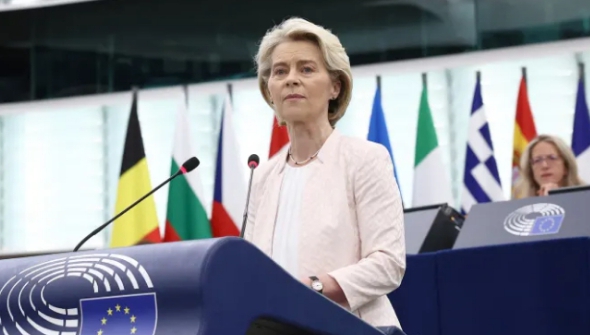The European Union, Ursula von der Leyen has been reelected for a second five-year term as President of the European Commission, following a decisive vote by EU lawmakers. This election marks a significant moment for the continent as it seeks to reaffirm its mainstream political direction against a backdrop of growing far-right influence.
Earlier today, in a compelling pitch to the European Parliament, von der Leyen outlined an ambitious vision for Europe’s future. Addressing the assembly in Strasbourg, she committed to investing in infrastructure and industry, forming a new “European Defense Union,” and continuing the continent’s green transition. Her speech resonated with many, emphasizing the importance of the upcoming term in shaping Europe’s global standing for the coming decades.
Von der Leyen’s reappointment was confirmed after a secret ballot, where she secured 401 votes in favor and 284 against, surpassing the required 360 votes to win a majority in the 720-seat parliament. The 65-year-old German politician, who first assumed office in 2019, has been a stalwart leader during tumultuous times, including the COVID-19 pandemic and the onset of Russia’s full-scale invasion of Ukraine.
As von der Leyen addressed the parliament before the vote, she asserted, “The next five years will define Europe’s place in the world for the next five decades. It will decide whether we shape our own future or let it be shaped by events or by others.” Her words underscored the gravity of the mandate she has received.
Despite the confidence in her leadership, von der Leyen’s position was not without challenges. Last month’s European elections saw a notable shift rightward, with far-right parties gaining unprecedented seats, thereby diminishing Brussels’ centrist stronghold. Nonetheless, her reelection was broadly anticipated, given her backing from key political groups, including the center-right European People’s Party (EPP), the center-left Socialist and Democrats (S&D), and the liberal Renew bloc. The Green bloc’s last-minute support further cemented her victory.
After the vote, von der Leyen expressed profound gratitude, describing her reelection as “a very emotional and special moment.” She reflected on the trials faced during her first term, noting, “We have spared no effort. We have navigated the most troubled waters that our union has ever faced. And we have kept the course on our long-term European goals.”
Earlier in the day, von der Leyen had published a comprehensive 31-page policy proposal, delineating her priorities for her second term. The document emphasized the necessity of maintaining a strong democratic center in Europe, amidst the rise of extreme political factions. She called on mainstream parties to address the significant challenges confronting citizens across the continent.
A key highlight of her agenda is the pledge to “turbo charge investment” in the green, digital, and social transitions, crucial for the cash-strapped EU governments. Von der Leyen also announced plans to establish a European Defense Union and appoint a commissioner for defense, a groundbreaking role for the bloc that has traditionally been focused on peacetime initiatives. This proposal aims to enhance collaboration among member states on defense matters, including the creation of a Europe-wide air defense system and strengthened cyber protection measures.
In a pointed remark, von der Leyen criticized Hungarian Prime Minister Viktor Orban’s recent meeting with Russian President Vladimir Putin, labeling it an “appeasement mission.” She vowed to maintain unwavering EU support for Ukraine, reinforcing her commitment to the bloc’s foreign policy stance.
Von der Leyen’s reelection is timely, coinciding with the EU’s second-highest court ruling against the commission for its lack of transparency in COVID-19 vaccine contract negotiations. This rebuke underscores the need for greater openness and accountability within EU institutions, a challenge von der Leyen will need to address in her second term.




